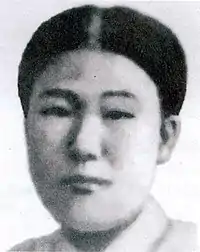Kang Kyeong-ae
Kang Kyŏng-ae (Korean: 강경애; 20 April 1906 – 26 April 1944) was a Korean writer, novelist and poet involved with the Feminist movement.[1] She is also known by her penname Kang Gama.
Kang Kyŏng-ae | |
|---|---|
 Kang Kyŏng-ae | |
| Born | April 20, 1907 |
| Died | April 26, 1943 |
| Occupation | Novelist |
| Period | 1907–1943 |
| Korean name | |
| Hangul | |
| Hanja | |
| Revised Romanization | Gang Gyeongae |
| McCune–Reischauer | Kang Kyŏngae |
Life
Kang Kyŏng-ae was born in Songhwa County, Hwanghae Province, Korean Empire and had an unhappy childhood.[2] She was the daughter of a servant and lost her father at the age of five. She was then forced to move to Changyeon where her mother remarried a man with three children. All of these circumstances resulted in substantial unhappiness.[3]
Kang was something of a prodigy and started teaching herself to read the Korean alphabet when she was eight years old using her step-father's copy of the Tale of Ch’unhyang at a time when female literacy was not greatly valued. By age ten, she had been nicknamed the “little acorn storyteller”[3] by neighborhood elders for whom she read traditional Korean tales.[3] She was also praised in school for her essay writing and often read stories for her friends.[3]
Kang enrolled in a Catholic boarding school with the help of her brother-in-law. She was later expelled for orchestrating and participating in a sit-in against the school's strict policies and a particularly cruel dorm mistress. She met a college student who was visiting from Tokyo, moved to Seoul with him, and began an affair. When the affair ended, she moved back to her family home in Hwanghae-do.[3]
In 1931 Kang began publishing her writing ("P'ag ŭm" or Broken Zither, 1931[4]), and moved to Manchuria as a newlywed, married to a communist who had divorced his first wife. She lived as a housewife in Yongjin and began to churn out literary works. This period lasted seven years after which Kang ceased writing fiction altogether.[3] This was partly related to the fact that she became the managing editor of the Manchurian Chosun Ilbo.[2]
On April 26, 1944, one month after her mother died,[3] Kang Kyŏng-ae died at her home in Hwanghae Province.
Work
Kang is often mentioned by literary critics as one of the foremost female writers of the colonial period.[4] Different from other prominent female authors of the time, such as Na Hye-sok and Heo Jong-suk, she focused solely on fiction and essay writing and did not branch out into other forms of artistic expression such as painting. She produced works focusing on the Korean underclass often based on her experiences with extremely poor Koreans in Manchuria, where many of her works took place. These include:[4] "The Broken Geomungo" (Pageum), "Vegetable Garden" (Chaejeon), "Football Game" (Chukgu jeon), and "Mother and Child" (Moja). She also wrote proto-feminist works focusing on women's oppression including "Mothers and Daughters" (Eomeoni wa ttal).[2] Most of her works are anti-love/anti family, in which only those women who cut their ties with their failed relationships can achieve freedom.[4]
From Wonso Pond (Ingan munje), which many consider her best work, is her only novel and deals with a multiplicity of class and gender issues.[5]
Works in English
From Wŏnso Pond (Feminist Press 2009) ISBN 978-1-55861-601-1
The Underground Village (Honford Star 2018)
Works in Korean
The Broken Geomungo (Pageum 1931)
Mothers and Daughters (Eomeoni wa ttal 1931)
Comet (Hyeseong 1931)
The Front Line (Jaeilseon 1932)
Vegetable Garden (Chaejeon 1933)
Football Game (Chukgu jeon 1933)
Existence, Nonexistence (Yumu 有無 1933)
Fathers and Sons (Buja 1934)
The Human Problem (Ingan munje 1934)
Salt (Sogeum 1934)
Drugs/Magic Medicine (Mayak)
Mother and Child (Moja 1935)
Writer's Fee: 200 won (Wongoryo Ibaekwon 1935)
Layoff (Haego 1935)
Underground Village (Jihachon 1936)
Mountain Man (Sannam 1936)
Darkness (Eodum 1937)
References
- "Kang Kyung Aae" LTI Korea Datasheet available at LTI Korea Library or online at: http://www.klti.or.kr/ku_01_02_011.do?method=author_detail&AI_NUM=538&admin_top_lid=ka_01&admin_m_p_seq=45&admin_s_seq=0&user_system=kuser Archived 2014-07-14 at the Wayback Machine
- Korean Literature Translation Institute: ":::::::::: 한국문학번역원 ::::::::::". Archived from the original on 2011-05-05. Retrieved 2011-05-03.
- Feminist Press: "Kang Kyong-ae | the Feminist Press". Archived from the original on 2011-08-07. Retrieved 2011-05-03.
- A History of Korean Literature. Peter H. Lee - editor. Publisher: Cambridge University Press. Cambridge, England. 2003. Page Number: 412.
- "From Wonso Pond | the Feminist Press". Archived from the original on 2014-01-17. Retrieved 2014-12-02.
External links
- 억압받는 하층여성을 대변하는 식민지시기 최고의 소설가 - 강경애 (in Korean)
- {{usurped|1=[이영아의 여론 女論]}} 강경애가 경성 문단을 떠난 이유 중앙일보 2012.06.04 (in Korean)
- [한국의 여성운동가들 5] 강경애 (in Korean)
- "3월 문화인물 소설가 강경애는 김좌진장군 암살교사범 동거녀" 조선일보 2005.01.17 (in Korean)
- 강경애(1907-1943) 여성문제를 인간문제로 파악한 문학인 (in Korean)